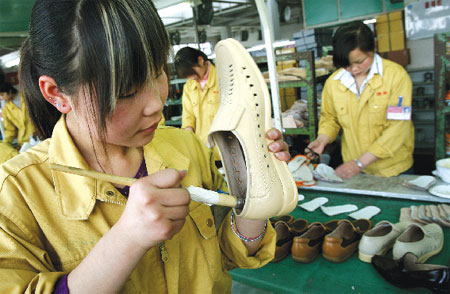
Manufacturers in the Pearl River Delta region are feeling the pinch from soaring costs and the rapidly rising yuan. AFP
DONGGUAN, Guangdong: This year has been a difficult one for Wang Wei, chairman of the Betta Footwear Factory in Dongguan, one of the major manufacturing cities in the Pearl River Delta region.
"We've had to face mounting pressure in the changing climate, caused by the appreciating yuan; rising raw material and labor costs; and more-stringent environmental- and labor-protection regulations," Wang said.
While his factory of more than 600 employees has struggled, many small shoe manufacturers have closed.
"The changing manufacturing and trade situation has caused unprecedented pressure for shoe manufacturers here," Wang said.
According to Huang Chunming, director of the Dongguan Leather and Shoes Association, more than 600 shoe factories have closed in the last two years in this city, which is widely recognized as "the shoe capital of the world", because it produces a tenth of the global footwear products.
Huang said the closings aren't unexpected, given that the footwear supply has already surpassed demand both domestically and abroad.
By the end of last year, Dongguan had about 4,400 registered shoe factories. "But due to severe competition in the markets at home and abroad, small-sized factories depending heavily on labor-intensive production have been phased out," he added.
Additionally, Huang attributed the "tough situation" to lower export rebates, the rising yuan, increasing price of raw materials and implementation of the new Labor Contract Law in January.
"After several years of depending on exports, many shoe factories have turned back to the domestic market due to the changing international trade environment," he said.
Through May of this year, Dongguan exported 250 million pairs of shoes, down 8.5 percent compared with the same period last year, according to sources with the Huangpu Customs.
Ding Li, a researcher at the Guangdong Academy of Social Sciences, called on local footwear factories to develop more competitive brands and strengthen research and development (R&D).
He added that companies "should realize that they can make better choices by focusing on R&D at the higher end of the industry chain, and by creating competitive brands at the lower end".
The globalization of manufacturing results in the need to find production bases with the lowest costs, and the Pearl River Delta has succeeded in grasping that opportunity over the past decades.
"But now our costs are rising too, and we need to be more competitive," Ding said.
In another development, Guangdong provincial government has encourage firms based in the Pearl River Delta (PRD) region to transfer to the northern mountainous areas, as well as to the east and west of the province, to avoid rising labor and production costs.
Guangdong Governor Huang Huahua said earlier this year that the government had planned a new policy to provide cheap power in those areas to encourage the labor-intensive industry to make the shift.

Editor: canton fair |




